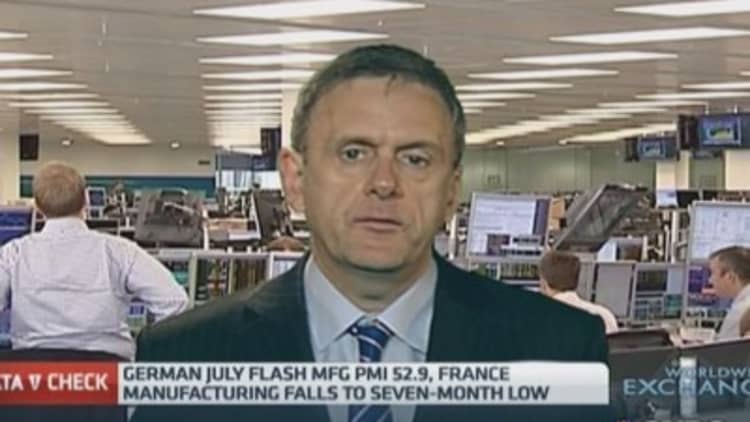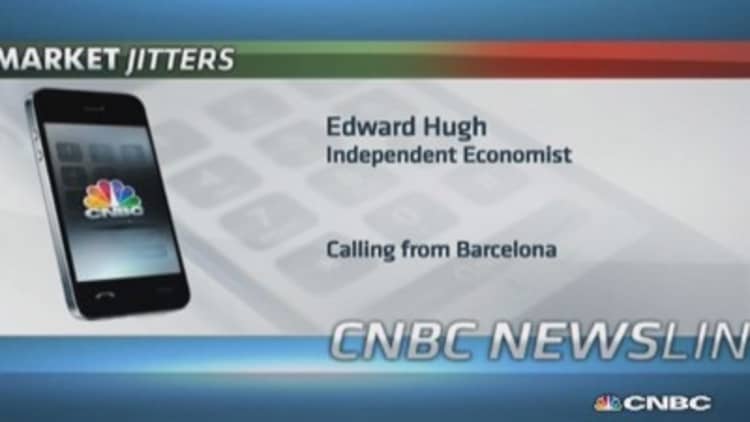
Business activity in the euro zone rebounded in July, according to Markit's closely-watched Purchasing Managers' Index (PMI), although concerns remain about France's sluggish economy.
The flash composite PMI for the whole of the euro zone came in at 54.0, up from a six-month low of 52.8 in June, where a number above 50 signals expansion. This was a three-month high, and surpassed expectations of 52.8 by analysts in a Reuters poll.
Read MoreEuro zone recovery losing steam as France struggles
European companies reported a pick-up in business, Markit said, but flagged that output prices continued to fall. Growth of new orders also slowed, likely as a result of ongoing geopolitical tensions in Ukraine in particular, it added.
Chris Williamson, chief economist at Markit, said the data suggested the economy is growing at "one of the strongest rates we have seen in the past three years."
But the PMIs indicate gross domestic product (GDP) growth in the euro zone of just 0.4 percent per quarter, he said, which "is not fast enough to encourage firms to take on staff in sufficiently large numbers to have a meaningful impact on unemployment."
The region's services sector powered ahead, Markit said, although manufacturing activity picked up only marginally.
Howard Archer, chief European economist at IHS Global Insight, said the PMIs provided the region with some "much needed and welcome good news".
"Current heightened geopolitical tensions are clearly a risk to recovery prospects but the July purchasing managers' surveys lift hopes that the euro zone economy can gradually gain traction over the second half of the year after a disappointing and lackluster first half," Archer added.
No turnaround in France
On a country-by-country basis, Markit said "strong national divergences persisted".
In France - which has been called the "sick man of Europe" by some economists - the private sector continued to contract in July, according to the PMIs. The flash composite PMI rose to 49.4 in July, from 48.1 in June.

The rate of decline eased following an improvement in the performance of the service sector, Markit said, which moved into expansionary territory. The country's manufacturing sector, however, disappointed, shrinking further in July.
The data come after economic growth in France ground to a halt in the first quarter. Gross domestic product (GDP) for the country was flat in the first three months of the year, after posting 0.2 percent growth in the fourth quarter of 2013.
Jack Kennedy, senior economist at Markit, said the PMI data indicated the country's economy was showing "little sign of turning around its recent sluggish performance."
Read MoreEuro zone business growth eases but recovery intact
In a note following the release, Naeem Aslam, chief market analyst at AvaTrade, added: "The fact remains very clear that growth story in the biggest economy of the Europe is not as robust as it was and the question stands that how long investors can turn their blind eye to this."
Germany's economy 're-accelerated'
It was a different story in Germany, however, where the flash composite PMI came in at 55.9 in July, up from 54.0 in June.
The services sector drove this acceleration in growth, Markit said, with activity growth hitting a 37-month high. Here - unlike in France - manufacturing output also rose.
"Following the joy of lifting the football World Cup trophy, July's flash PMI results provide further positive news for Germany," Oliver Kolodseike, an economist at Markit, said in a note.
"The headline index - which measures the combined output of both the manufacturing and services sectors - rose to a three-month high at the start of the third sector, suggesting that growth in the euro zone's largest economy has re-accelerated."


